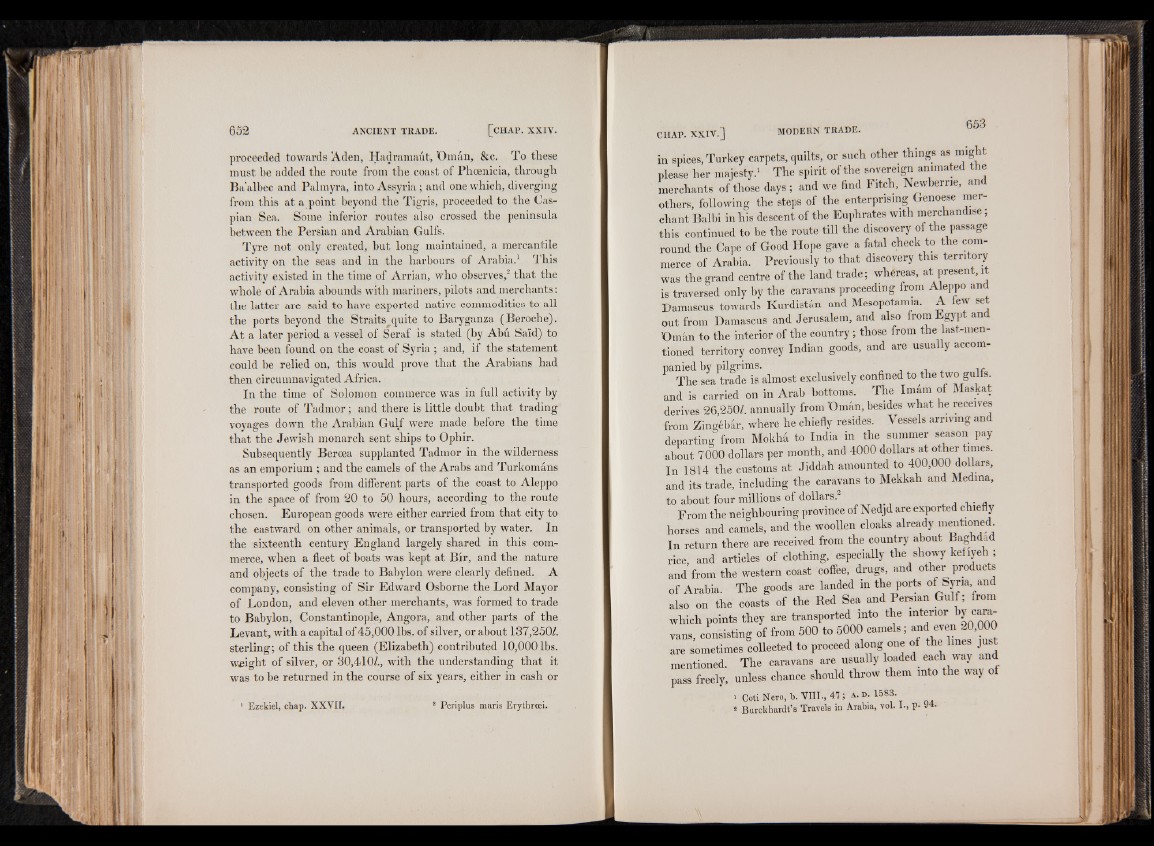
proceeded towards Aden, Hadramaút, ’Omán, &c. To these
must be added the route from the coast of Phoenicia, through
Ba’albec and Palmyra, into Assyria; and one which, diverging
from this at a point beyond the Tigris, proceeded to the Caspian
Sea. Some inferior routes also crossed the peninsula
between the Persian and Arabian Gulfs.
Tyre not only created, but long maintained, a mercantile
activity on the seas and in the harbours of Arabia.1 This
activity existed in the time of Arrian, who observes/ that the
whole of Arabia abounds with mariners, pilots and merchants:
the latter are said to have exported native commodities to all
the ports beyond the Straits^quite to Baryganza (Beroche).
At a later period a vessel of Seraf is stated (by Abu Said) to
have been found on the coast of Syria ; and, if the statement
could be relied on, this would prove that the Arabians had
then circumnavigated Africa.
In the time of Solomon commerce was in full activity by
the route of Tadmor; and there is little doubt that trading
voyages down the Arabian Gulf were made before the time
that the Jewish monarch sent ships to Ophir.
Subsequently Beroea supplanted Tadmor in the wilderness
as an emporium ; and the camels of the Arabs and Turkomans
transported goods from different parts of the coast to Aleppo
in the space of from 20 to 50 hours, according to the route
chosen. European goods were either carried from that city to
the eastward on other animals, or transported by water. In
the sixteenth century England largely shared in this commerce,
when a fleet of boats was kept at Bir, and the nature
and objects of the trade to Babylon were clearly defined. A
company, consisting of Sir Edward Osborne the Lord Mayor
of London, and eleven other merchants, was formed to trade
to Babylon, Constantinople, Angora, and other parts of the
Levant, with a capital of45,000 lbs. of silver, or about 137,250/.
sterling; of this the queen (Elizabeth) contributed 10,000 lbs.
weight of silver, or 30,410/., with the understanding that it
was to be returned in the course of six years, either in cash or
1 Ezekiel, chap. XXVII. s Periplus maris Erythroei.
in spices, Turkey carpets, quilts, or such other things as might
please her majesty.1 The spirit of the sovereign animated the
merchants of those days ; and we find Fitch, Newberne, and
others, following the steps of the enterprising Genoese merchant
IS
Balbi in his descent of the Euphrates with merchandise;
this continued to be the route till the discovery of the passage
round the Cape of Good Hope gave a fatal check to the commerce
of Arabia. Previously to that discovery this territory
was the grand centre of the land trade; whereas, at present, it
is traversed only by the caravans proceeding from Aleppo and
Damascus towards Kurdistan and Mesopotamia. A few set
out from Damascus and Jerusalem, and also from Egypt and
’Oman to the interior of the country; those from the last-mentioned
territory convey Indian goods, and are usually accompanied
by pilgrims. . j
The sea trade is almost exclusively confined to the two gulfs.
and is carried on in Arab bottoms. The Imam of Maskat
derives 26,250/. annually from ’Oman, besides what he receives
from Zingebar, where he chiefly resides. Vessels arriving and
departing from Mokh4 to India in the summer season pay
about 7000 dollars per month, and 4000 doilars at othertimes.
In 1814 the customs at Jiddah amounted to 400,000 dollars,
and its trade, including the caravans to Mekkah and Medina,
to about four millions of dollars.2
From the neighbouring province of Nedjd are exported chiefly
horses and camels, and the woollen cloaks already mentioned.
In return there are received from the country about Baghdad
rice and articles of clothing, especially the showy kef iyeh ;
and from the western coast coffee, drugs, and other products
of Arabia. The goods are landed m the ports of Syria and
also on the coasts of the Red Sea and Persian Gulf; from
which points they are transported into the interior by cara-
vans, consisting of from 500 to 5000 camels; and even 20,000
are sometimes collected to proceed along one of the lines just
mentioned. The caravans are usually loaded each way an
pass freely, unless chance should throw them into the way of